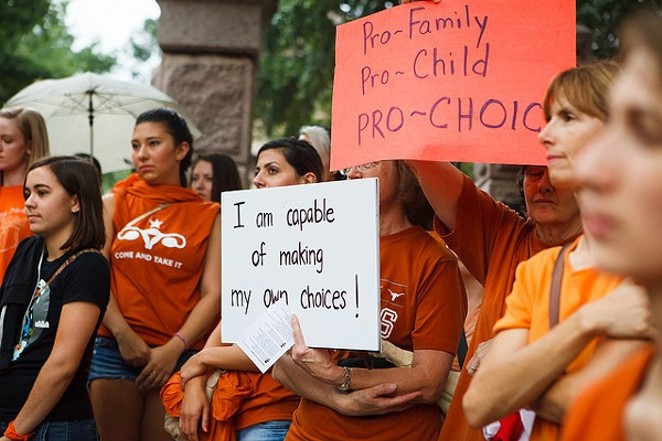In June, the U.S. Supreme Court ruled in the country's most important abortion case in more than two decades, blocking parts of a Texas law that threatened to shutter most of the state's abortion clinics under the guise of women's health and safety.
In overturning key provisions of Texas' House Bill 2 (the one former state Sen. Wendy Davis famously, and unsuccessfully, filibustered to try to stop), the Supreme Court set a new legal standard: in deciding whether a law is an unconstitutional burden on a woman’s right to choose, you have to consider actual science, research and experts—basically, facts matter. Pro-choice attorneys were thrilled with the ruling, not just because it saved clinics from closing and will allow for many others to reopen, but also because it gave them a new tool to challenge what they say are countless other abortion regulations that don't meet the new standard that was just set by the Supremes.
Now, they say Texas health officials are trying to add one to the list restrictions that won't pass legal muster. Last month, on the heels of the Supreme Court's precedent-setting abortion ruling, the Texas Health and Human Services Commission, without notice or announcement, proposed a new rule that would require the cremation or burial of fetal remains. The Center for Reproductive Rights, which argued for and won the precedent-setting abortion ruling that they say now renders many other abortion restrictions unconstitutional, this week sent a letter to state health officials all but threatening to sue if the new fetal-burial rule goes through (the final rule is expected to take effect sometime in September).
The new rule would require abortion providers to cremate or bury fetal remains, regardless of the period of fetal gestation. The rule would even apply to miscarriages, which the health commission calls “spontaneous abortions.” (Abortion clinics currently use third-party special waste disposal services.)
Once the public finally noticed the proposed rule change this summer, HHSC spokesman Bryan Black told the Texas Tribune the rules were developed to ensure “the highest standards of human dignity.” Gov. Greg Abbott has since tried to literally bank off the issue as, last month, he sent fundraising emails to supporters saying fetal remains shouldn't be “treated like medical waste and disposed of in landfills.” Abbott reportedly wants lawmakers to write the new rule into law when they head back to the legislature in January.
Reproductive rights lawyers argue the disposal requirements are "designed to further stigmatize and disempower patients seeking abortion care and treatment for miscarriage." In its letter, the Center says the rule would be "burdensome for both abortion care and miscarriage management" and does "nothing to protect patient health or safety." (Black with HHSC hasn't responded to our questions; we'll update if and when he does.)
In its letter, the Center also called the timing of the proposed rule change curious, saying the language was published just days after Texas’ latest abortion restrictions were struck down by the Supreme Court in Whole Woman's Health v. Hellerstedt and right before a holiday weekend. "These circumstances strongly suggest that Texas intended to make these changes to the regulations surreptitiously, and without an opportunity for meaningful study, review, or comment.” The Center argues that if you add all of that to Abbott’s fundraising email, it should be clear the proposed amendments aren’t about public health and safety but rather “an effort to seek political advantage by undermining women’s rights.”
The Center concludes its letter to state health officials by saying the rule change would be "an unwise course for DSHS (the Department of State Health Services)."
“The proposed amendments will almost certainly trigger costly litigation for Texas.” (Reminder: Texas spent more than $1 million fighting to save abortion restrictions the Supreme Court ultimately called unconstitutional.)
Pro-choice lawyers and reproductive rights activists have already told us they're gearing up for the "repeal work" that needs to be done after the victory in Whole Woman's Health v. Hellerstedt, which they say empowers them to roll back the kind of laws that require medically-unnecessary ultrasounds, prolonged wait periods, and information booklets that actually lie to women about the risks associated with abortion.
The battle over Texas' fetal-burial proposal could show us whether the Supreme Court's abortion ruling has a prophylactic effect, too.


